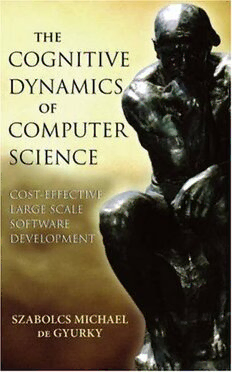
The Cognitive Dynamics of Computer Science: Cost-Effective Large Scale Software Development PDF
Preview The Cognitive Dynamics of Computer Science: Cost-Effective Large Scale Software Development
THE COGNITIVE DYNAMICS OF COMPUTER SCIENCE Cost-Effective Large Scale Software Development Szabolcs Michael de Gyurky ComputerArtwork by Mark A. Tarbell A JOHN WILEY & SONS, INC., PUBLICATION THE COGNITIVE DYNAMICS OF COMPUTER SCIENCE Press Operating Committee Chair Editor-in-Chief Roger U. Fujii, Donald F. Shafer Vice President Chief Technology Officer Northrop Grumman Mission Systems Athens Group, Inc. Board Members Mark J. Christensen, Independent Consultant Herb Krasner, President, Krasner Consulting Ted Lewis, Professor Computer Science, Naval Postgraduate School Hal Berghel, Professor and Director School of Computer Science, University of Nevada Phillip Laplante, Associate Professor Software Engineering, Penn State University Richard Thayer, Professor Emeritus, California State University, Sacramento Linda Shafer, Professor Emeritus University of Texas at Austin James Conrad, Associate Professor UNC- Charlotte Deborah Plummer, Manager- Authored books IEEE Computer Society Executive Staff David Hennage, Executive Director Angela Burgess, Publisher IEEE Computer Society Publications The world-renowned IEEE Computer Society publishes, promotes, and distributes a wide variety of authoritative computer science and engineering texts. These books are available from most retail outlets. Visit the CS Store at http://computer.org/cspressfor a list of products. IEEE Computer Society / Wiley Partnership The IEEE Computer Society and Wiley partnership allows the CS Press authored book program to produce a number of exciting new titles in areas of computer science, computing and networking with a special focus on software engineering. IEEE Computer Society members continue to receive a 15% discount on these titles when purchased through Wiley or at wiley.com/ieeecs To submit questions about the program or send proposals please e-mail [email protected] or write to Books, IEEE Computer Society, 100662 Los Vaqueros Circle, Los Alamitos, CA 90720-1314. Telephone +1-714-821-8380. Additional information regarding the Computer Society authored book program can also be accessed from our web site at http://computer.org/cspress THE COGNITIVE DYNAMICS OF COMPUTER SCIENCE Cost-Effective Large Scale Software Development Szabolcs Michael de Gyurky ComputerArtwork by Mark A. Tarbell A JOHN WILEY & SONS, INC., PUBLICATION Copyright#2006byJohnWiley&Sons,Inc.Allrightsreserved PublishedbyJohnWiley&Sons,Inc.,Hoboken,NewJersey PublishedsimultaneouslyinCanada Nopartofthispublicationmaybereproduced,storedinaretrievalsystem,ortransmittedinanyformor byanymeans,electronic,mechanical,photocopying,recording,scanning,orotherwise,exceptas permittedunderSection107or108ofthe1976UnitedStatesCopyrightAct,withouteithertheprior writtenpermissionofthePublisher,orauthorizationthroughpaymentoftheappropriateper-copyfeeto theCopyrightClearanceCenter,Inc.,222RosewoodDrive,Danvers,MA01923,(978)750-8400,fax (978)750-4470,oronthewebatwww.copyright.com.RequeststothePublisherforpermissionshould beaddressedtothePermissionsDepartment,JohnWiley&Sons,Inc.,111RiverStreet,Hoboken,NJ 07030,(201)748-6011,fax(201)748-6008,oronlineathttp://www.wiley.com/go/permission. LimitofLiability/DisclaimerofWarranty:Whilethepublisherandauthorhaveusedtheirbesteffortsin preparingthisbook,theymakenorepresentationsorwarrantieswithrespecttotheaccuracyor completenessofthecontentsofthisbookandspecificallydisclaimanyimpliedwarrantiesof merchantabilityorfitnessforaparticularpurpose.Nowarrantymaybecreatedorextendedbysales representativesorwrittensalesmaterials.Theadviceandstrategiescontainedhereinmaynotbe suitableforyousituation.Youshouldconsultwithaprofessionalwhereappropriate.Neitherthe publishernorauthorshallbeliableforanylossofprofitoranyothercommercialdamages,includingbut notlimitedtospecial,incidental,consequential,orotherdamages. Forgeneralinformationonourotherproductsandservicesorfortechnicalsupport,pleasecontact ourCustomerCareDepartmentwithintheUnitedStatesat(800)762-2974,outsidetheUnitedStatesat (317)572-3993orfax(317)572-4002. Wileyalsopublishesitsbooksinavarietyofelectronicformats.Somecontentthatappearsinprint maynotbeavailableinelectronicformat.FormoreinformationaboutWileyproducts,visitourwebsite atwww.wiley.com. LibraryofCongressCataloging-in-PublicationDataisavailable. TheCognitiveDynamicsofComputerScience:Cost-EffectiveLargeScaleSoftwareDevelopment deGyurky,SzabolcsMichael ISBN13:978-0-471-97047-7 ISBN10:0-471-97047-6 PrintedintheUnitedStatesofAmerica 10987654321 To Immanuel Kant That wonderful teacher, that exquisite mind and heart, and beautiful soul. CONTENTS List of Figures xv Acknowledgments xvii Chapter 1 Introduction 1 1.1 The Retention of Software Jobs 2 1.2 Depth of Experience 2 1.3 The Scope of This Book 3 1.4 The Nature of Computer Science 4 1.5 The Future of Computer Science 4 1.6 The Essence of Philosophy 5 1.7 Why Autonomy? 6 1.8 An Architecture for Autonomy 8 1.9 Other Notes 9 Chapter 2 Prologue 11 2.1 How This Book Originated 11 2.2 The Importance of Management 12 2.3 The Tie-in with Autonomy 13 2.4 Major Themes of This Book 14 2.5 The Challenge of a New Idea 14 2.6 The Importance of Visualization 15 2.7 The Move Toward Autonomy 16 2.8 Why I Wrote This Book 17 2.9 Merging Theory and Practice 18 2.10 The Pace of Computer Science 19 2.11 The Importance of Cognitive Dynamics 21 Chapter 3 The Philosophical Foundations of Computer Software Design 23 3.1 The Philosophical Origins of Computer Science 23 3.2 Influence of the Cognitive Philosophers 25 3.3 Abstracting the Human Thought System 27 3.4 The Philosophical Foundations of Software Development 28 3.5 The Phenomenon of Reality 29 vii viii CONTENTS 3.6 The Phenomenon of Subjectivity 30 3.7 Low-Cost Software Development 31 3.8 ‘‘On Budget and On Schedule’’ 33 3.9 The Time to Completion: Schedule 34 3.10 Philosophy and Successful Design 35 Chapter 4 The Philosophical Imperatives of Architectural Design 36 4.1 The Manager as Architect 36 4.2 The Manager as Teacher 37 4.3 The Manager as Social Worker 38 4.4 The Manager as Axman 39 4.5 The Philosophical Imperatives of Architectural Design 39 4.6 Availability of the Manager 40 4.7 Project Manager: 10 Key Attributes and Responsibilities 40 4.8 Philosophical Aspects of Engineering 43 4.9 The Importance of Finishing the Job 44 4.10 Visualizing an Architecture 44 4.11 The Role of Intuition in Design 47 4.12 ‘‘Sufficient Reality’’ and Inference in the Design Process 48 4.13 Dialectics in the Achievement of Sufficient Reality 49 4.14 The Relationship of Logic to Software Architectures 50 4.15 The Logic of the Systems Design 53 Chapter 5 Project and Task Organization 54 5.1 The Role of Organization 55 5.2 The Ability to Organize 57 5.2.1 Traditional Hierarchical Project Organization 57 5.3 The Difficulty of Communication 60 5.4 The Title of ‘‘Manager’’ 61 5.5 The Flat, Nonhierarchical Organization 61 5.6 Projects, Tasks, and Work Units 65 5.7 Large Organizations and Staffing 66 5.8 Staffing Up: The Initial Team 69 5.8.1 The Initial Team 69 5.8.2 Phase One Team Expansion 70 5.8.3 Phase Two Team Expansion 72 5.9 Balancing Hardware and Software 73 5.10 Incremental Deliveries 75 5.11 Functional Organization 76 5.12 Interface Protocols of the Organization 77
